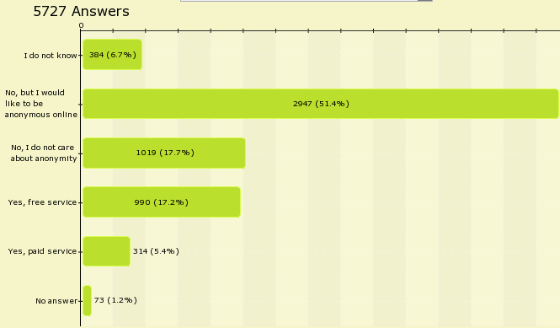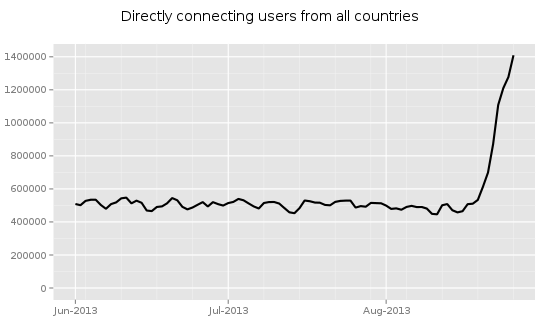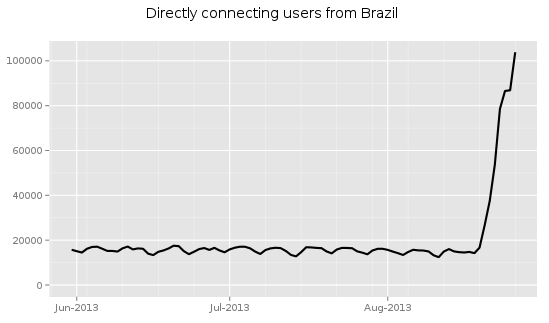 Two years ago The Pirate Bay renamed itself to The Research Bay to promote its collaboration with the Cybernorms research group at Lund University.
Two years ago The Pirate Bay renamed itself to The Research Bay to promote its collaboration with the Cybernorms research group at Lund University.
The notorious BitTorrent site encouraged visitors to take part in a survey into people’s file-sharing habits and their views on copyright enforcement. In total 75,000 people from all over the world eventually participated in the study, making it the largest of its kind.
Since the study took place the researchers have already shared many of their findings. For example, we know that girls are just as much into porn as guys, and that the majority of Pirate Bay users planned to use VPNs or other measures to become more anonymous.
Today the Cybernorms research group has opened up all the findings to the public, sharing a wealth of information. On The Survey Bay people can check a wide variety of statistics, and compile their own graphs.
The graph below, for example, shows how many North American Pirate Bay users, who share daily, had a VPN or wanted to use one in the future.
VPN use among daily sharing North Americans

In addition to answering the fixed questions, roughly 25,000 people provided a comment to explain why they use The Pirate Bay. Recurring themes that we have identified are an inability to pay, either because respondents have no money or because there are no decent legal options available. In addition, many respondents feel that they have a right to share.
The justifications come in all shapes and sizes, and we have made a selection of a few notable ones from a diverse range of demographics.
—
A 66+ year old woman from United States writes:
“I don’t know these things. Even though I’ve been in computers (pause) since 1965. The corporations are out to make us slaves and to rule through fear. And I am certain, life will find a way. I will support communication. People need it for freedom and decisions. (just to recall, the corporations have made copy-write law a tool of money and not of encouraging innovation. Remember Microsoft’s words echoing 1984, (have to paraphrase) Innovation through standardization. Information wants to be free. (Because you are Swedish Ill remind you that those are words of the Internet pioneers. We built this for the people.)”
A 25-29 year old man from United States writes:
“As an artist myself, along with being an avid Sci-Fi buff, I believe that if we focused more on sharing ideas and less on making ourselves filthy rich that we would currently be at a point of technological advancement far beyond our imaginations. Law is necessary to prevent anarchy but not at the oppression of ideas or the people who imagine them. Most laws in the USA go against our founding fathers original ideals. Most laws in the USA are tailor made to suit corporations who, above all else, desire money and power. File-sharing will never die, regardless if laws are passed to prevent it, as long as people in the world are willing to fight for the right to share information.”
A 18-24 year old woman from Western Europe writes:
“The authorities just don’t understand the zeitgeist and continue to unintentionally encourage illegal filesharing all over the place. In Germany you can’t access most YouTube videos with commercial music because of a GEMA lawsuit: if you just wanted to check out this one song by an artist for free to see whether you liked it (as you would do on the radio which nobody listens to anymore) you are encouraged to download their album (after seeing it on YouTube some may have bought it instead). More generally: you may not buy the music but pay for concert tickets. Well not anymore because ticket prices are skyrocketing because the music industry is out of money.”
A 66+ year old man from Europe writes:
“I am so old and find it rather expensive to buy anything these days, being a pensioner it does not leave a great deal of money to spend on goods once you have paid all the usual bills, gas, electric and like wise. but keep up the good work and thank you.”
A 37-45 year old woman from South East Asia writes:
“If it wasn’t for file sharing, I wouldn’t be able to watch movies. In the country I live in, I cannot go to the cinema/movies to see an American film or other films in the English language. I’m pretty thankful for these sites.”
A 30-36 year old man from East Asia writes:
“I only file share because I live on US military bases and the MPAA and other stupid laws don’t exempt us from the blocks they put in place to watch things legally. So…why I do it? I do it just to give them the proverbial finger. If it was on TV out here, I would watch it. If it was available overseas to me, I would watch it. The problem is, there is NO LEGAL means to watch it from.”
A 53-65 year old woman from Australia writes:
“Hi, as an Australian academic researcher and a file-sharer am very interested in your survey as I had intended to run a similar project via an ISP, and many of my questions were similar to yours! As you will probably know Big Content has recently lost (twice, once on appeal) its case against major Aussie ISP iinet that the ISP was helping copyright infringements. This case is likely to be heard one last time, before the highest court. In the meantime iiNet has developed a model proposing an independent authority mediate between content owners and alleged file-sharers. Despite our relatively slow net speeds and high chargers, Australians download much content — in part because TV is woeful here and popular UK and US seasons take often 1-2 years to reach the airwaves. I predict more people will use TOR and VPN as the government is likely to implement anti-file-sharing regulations following the final episode of the iiNet court saga..whatever the outcome.”
A -17 year old man from New Zealand writes:
“I believe the biggest problem facing file-sharing is the idea of forcing ISPs to monitor traffic to make sure people aren’t illegally sharing file. This is a blatant breach of privacy and unless major corporations take a step back and stop interfering in the processes involved in catching cyber-criminals, they face widespread backlash from the file-sharers and activists of the world.”
A 30-36 year old woman from Southern Africa writes:
“In my opinion developing countries cannot cater to the huge demand for current commercial tv series. TV series are sometimes years behind the country of origin. The demand is out there, people get hooked on their favorite shows but their countries conditions may cause them to satisfy the demand by means of file-sharing. Many people would not mind paying eg $1.99 per show download as is available on amazon, but the facility is not available outside the US. So, in my opinion, file-sharing will probably soon force networks to expand their services to include the international online demand.”
A 18-24 year old man from Central Africa writes:
“In Africa most online services are unavailable, file sharing is the at times the only way to have some material coming from developed countries so most Africans use file sharing more as a means of staying at the same level as the rest of the world than trying to somehow forge or steal copyrighted products. It is their right for people to share things they came to own, so it is as well their right for people to take what is shared! The assets of sites like google, youtube or ebay tend to neglect the third world where a real market is present. Hopefully changes will be made in a near future we cross our fingers.”
A 18-24 year old woman from South America writes:
“In my country its common to see street vendors with pirate copies of films. Some of them are linked to organized crime (the kind that also deals with drugs and politics). I remember one particular national film made it to the streets way before it was out either in Theaters or at download sites (it actually helped with the marketing, but the point is whoever was responsible was well positioned in the film industry, had some interesting friends and didn’t do it for the sharing). I wish file sharing was legalized and the time and public resources spent on it were focused on dismantling *those* networks. And that artists\crew\creators (and local communities, when applicable) had a larger cut of the earnings.”
A 37-45 year old man from Paraguay writes:
“Hello! I live in Paraguay, i consume incredible amounts of music (Rock-Metal) and Video Games, I only use file sharing to like trial stuff, for example, I download some mp3s, and if I like the music, I buy the original CD online, in Amazon or The End Records etc. For me, is wrong to download software, or videogames, but in the case of music, helps me to discover new bands, styles etc. In the software or video games, i do the same thing, but as we all know, a downloaded software or game never works well, so I tested it, then if I like It, I deleted the download and buy the original stuff..!! Thanks!”
—
The above is of course just a small and rather random selection of the responses. There are plenty more gems available on The Survey Bay website.
To all Pirate Bay users that haven’t filled out the survey, but want to have their say, feel free to do so in the comments below. Links to other notable comments are welcome too.
Source: Find Out Who’s Using The Pirate Bay… and Why

 On the occasion of its 10th anniversary last Saturday, The Pirate Bay shared a gift with its users – the PirateBrowser.
On the occasion of its 10th anniversary last Saturday, The Pirate Bay shared a gift with its users – the PirateBrowser.


 Two years ago The Pirate Bay renamed itself to
Two years ago The Pirate Bay renamed itself to 



 Once one of the
Once one of the